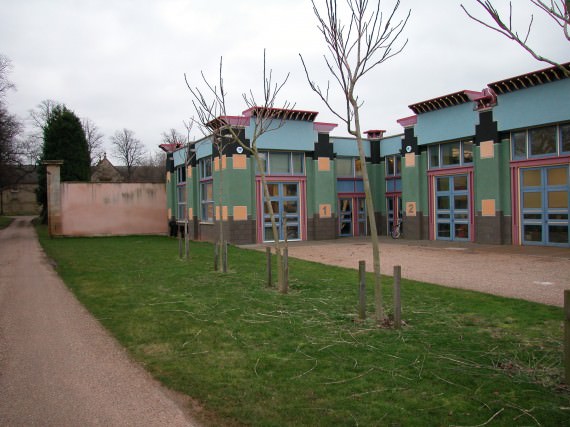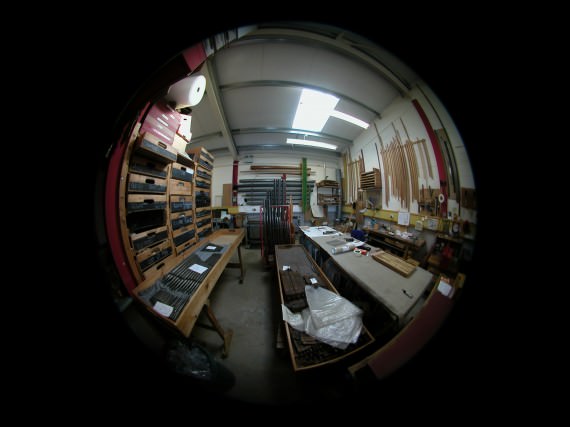About

Background
The firm was set up by Martin Goetze and Dominic Gwynn in September 1980, to start with in a small workshop in Northampton, and from March 1985 in a purpose-built workshop at Welbeck near Worksop in North Nottinghamshire, on the northern edge of Sherwood Forest (S80 3LW UK). The aim has always been to work with a small team of committed organbuilders, flexible and with a complete range of skills.
The original directors had a particular interest in classical organs with mechanical key and stop actions, and in re-creating the musical culture of the past. That is changing as a new team takes over. Sadly Martin Goetze died in 2015 and Dominic Gwynn died in 2024, and following Edward Bennett’s retirement in 2021 we have been joined by Robert Balfour Rowley, who is now the current Director. Rob’s particular interest is in the theatre organ, though his interests and experience in the organ world is wide.
The workshop is part of a group of craft workshops at Welbeck, provided by the Harley Foundation http://www.harleygallery.co.uk/foundation/ a charitable trust set up with a legacy from the 7th Duke of Portland. It was designed by John Outram http://www.johnoutram.com/welbeck.html . We are fortunate to be working in beautiful rural surroundings, in a modern workshop, surrounded by some of the finest craftspeople in the country https://www.harleygallery.co.uk/harley-studios/.
We are committed to training the next generation of organbuilders.

Who we are
There were for many years three directors, Martin Goetze, Dominic Gwynn and Edward Bennett, and usually three or four other craftsmen. Martin Goetze died in September 2015. In July 2020 Robert Balfour-Rowley joined Dominic Gwynn as a director, and in August 2021 Edward Bennett retired. The directors are full time organbuilders. The directors did share responsibility for the design, supervision and finishing of each project, an advantage of a small firm with a committed staff and experienced directors is that much of the responsibility is shared.
Edward Bennett studied organ at the Guildhall School of Music in London, started organbuilding with Grant, Degens and Bradbeer in Northampton in 1971, and gained further experience with Hradetsky in Austria and at the Sydney Opera House in Australia, and with Peter Collins before joining the firm in 1985. He is now organist at St Anne’s Worksop. Edward retired on 18th August 2021, his 73rd birthday! He still pops into the workshop now and then.
Martin Goetze started organbuilding with Grant, Degens and Bradbeer in Northampton in 1971, and further with Gabriel Kney in London, Ontario in Canada, before starting the firm with Dominic Gwynn in 1980. Martin died on 23rd August 2015.
Dominic Gwynn studied Modern History at St John’s College, Oxford and started organbuilding with Hendrik ten Bruggencate in Northampton in 1976, before starting the firm in 1980. He is researching and writing a book on organbuilding in early modern English society and culture. Dominic died on 24th May 2024.
Further information regarding the history of the firm and information about each of the original three directors can be found in the History section.
Emma Hagen has worked at Goetze and Gwynn since 2009 and runs the office on a part time basis. As the longest serving member of staff she is a link to past projects ensuring some continuity.
Abigail Balfour-Rowley returned to Goetze and Gwynn in October 2020 having left us in January 2018 to join her husband Rob. Abi joined us as a trainee organ builder in January 2013, after a degree in Psychology at Lancaster University, organ playing at Lancaster Priory and tuning with David Wells in Liverpool. She has worked in all parts of the workshop since then, and particularly voicing and tuning. She has voiced our reeds, with Martin in the last years of his life.
Robert Balfour-Rowley came to organ building via a roundabout route. He trained at MANCAT in Manchester as an electronic engineer after leaving school in 1995. During college Rob volunteered with an amateur group the Lancastrian Theatre Organ Trust, helping to maintain two Wurlitzer theatre pipe organs. Rob worked as an electronic engineer for several years after leaving college, before starting his own business specialising in theatre organ restoration. In 2009 Rob joined Harrison and Harrison ltd primarily doing site work, tuning and voicing. After 7 very enjoyable years with them, Rob decided to start his own firm again, taking on theatre organ work as one of the few professionals in the industry with a significant insight into those instruments. In July 2020 joined Goetze and Gwynn Ltd as a director and organ builder.
Tristan Moore joined in May 2023, with over 20 years’ experience. Tristan has worked for Manders and Kenneth Tickell, on many projects of all shapes and sizes, from restoration to new organs. Tristan has worked around the world organ building, and particularly enjoys the variety that comes with our team. Tristan does most of our design work, along with a fair chunk of our tuning and voicing. In his other career, Tristan is a Lay Clerk at Southwell Minster. He enjoys fine dining and a Mcdonalds breakfast..
Joseph Marsden returned in November 2024, after a time away enjoying other things including tree surgery! Joe is a very skilled organ builder, particularly adept at pipe making and repairs, that said, he is also particularly adept at many other elements of organ building. He has a keen eye for historic interest and detail, and is very inspired and intrigued by historic practise and materials. Joe started his organ building as an apprentice at Goetze and Gwynn, and we are very glad to have him back within our team, helping to guide us forward.
Mike King joined in November 2024. Mike is a fun-loving big bird covered in tattoos… we all love him! Mike comes to us from an industrial woodworking background with everything from making sash windows, door frames and architectural woodwork for historic buildings, to bespoke kitchen and bedroom furniture. He is a highly skilled wood machinist, bringing us knowledge of process and machining which is very valuable to the team.
Simon Berry joined in July 2025. Simon comes to us as a trainee organ builder, he has a very interesting life outside of the 9 to 5. Simon teaches Historic European Martial Arts, and is in demand as part of a group of Medieval reenactors. Whilst the armour is often in his car, we haven’t yet had need of it in the workshop. Simon has a keen interest in making much of his armour, and leather parts of the outfits they use, and has made many leather items for film and TV. Simon has many interesting, transferable skills with metal and leather.
Anthony Edgar joined in August 2025. Anthony is the youngest of our workforce having graduated from university with a model making degree, he has an excellent attention to detail and has an understanding of many different material types. Anthony has a keen interest in classic cars, and has started a collection!
Sarah Clarke joined in August 2025, originally employed with the idea of being a workshop labourer, however with Sarah’s keen eye for detail, affinity with craft materials, and excellent dexterity with tools and materials, she is well on her way to becoming a capable organ builder!!

What we Do
New organs: we make all the parts of the organ in our own workshop, apart from the blower. We use various woods in our organs, primarily Oak and Pine. The wood is air-dried, firstly outside for one to two years, and then in the workshop to the level of the building where the organ will eventually live. We usually use cow-bone and ebony for the keys, and we make our own metal and wooden pipes. The workshop environment is controlled for temperature and humidity, so that the organ can be made at the average temperature of its new home.
Many of our organs have been made for use by professional musicians in the field of Early Music. We look to instrument makers of the Early Music world for inspiration, advice and encouragement in this field. The constructive support of musicians in the Early Music world has been a vital influence on our attitude to our work.
Restoration: we follow museum standards of restoration. We are experienced in restoring historic organs from the 17th century the 1960s and 1970s. We have had the experience and expertise to restore classical organs with mechanical key and stop action. We now have the experience and expertise to restore romantic organs with electro-pneumatic and pneumatic actions, theatre and fairground organs.
We are Business Members of the Institute of British Organbuilding, and are members of ICON. In 1999 we were shortlisted for the Jerwood Conservation Award for our work on the 1826 Elliot organ at Belton Hall and in 2004 we were runners-up for our work on the 1829 Bishop organ at St James Bermondsey. We have worked for the National Trust, the Royal Collection and for a number of other collections and museums.
We conduct research into old organs and make it available in photocopied reports. The Harley Monographs are technical reports on organs restored or researched by ourselves. They are available for free on this website, https://www.goetzegwynn.co.uk/reports/ . We were inspired by the British Institute of Organ Studies and have contributed to its Journal, committees and meetings. We have played a full part in our professional association, the Institute of British Organbuilding, serving on its board (Martin as President 2009-13), contributing to its Journal, organizing training days, writing articles and giving talks of various kinds.